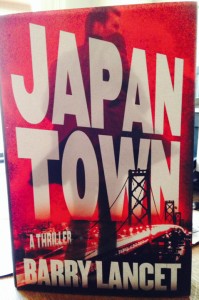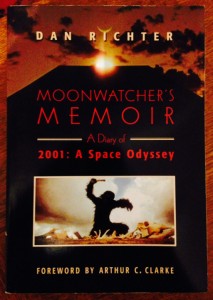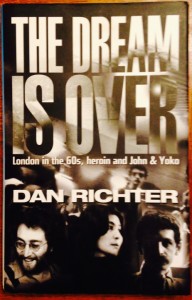#FridayReads–Barry Lancet’s Thriller, “Japantown” & Dan Richter’s “The Dream is Over,” Memoir of the 60s
 #FridayReads, Jan 31–Barry Lancet’s thriller, Japantown and Dan Richter’s The Dream is Over, a memoir of the 60s.
#FridayReads, Jan 31–Barry Lancet’s thriller, Japantown and Dan Richter’s The Dream is Over, a memoir of the 60s.
I’d made Japantown my #FridayReads last weekend, when I had read only about 140 pages of the nearly 400-page fast-paced international thriller. The rest of the book was every bit as riveting, and overall, hugely enjoyable. I liked it so much that, on Wednesday night, heading out to hear live music–I stowed the hardcover book in my knapsack, along with my handy bike flashlight–and read deep in to its last chapters between sets in the dimly lit music room at Pianos, inching toward the suspenseful climax which I reached the following morning. Here’s an abbreviated version of the plot rundown from my post last week:
“The book is at first set in San Francisco where protagonist Jim Brodie works as a dealer in Asian antiquities, while also maintaining connections with the private detective agency his late father founded and ran in Tokyo. Brodie’s widowed, a single dad living with his grade school-age daughter, Jenny. Brodie is the new go-to-guy when the San Francisco Police Department find itself investigating a grisly mass murder with Japanese victims and Japanese cultural characteristics. At the crime scene, Brodie finds only one clue, a paper artifact emblazoned with an obscure written character (kanji in Japanese). Brodie doesn’t realize, though the reader sees, that even as he surveys the scene of the brutal killing he and his Homicide Dept confidant are being surveilled with lenses and cameras by unknown agents. Though not understanding the full extent of the danger he’s in, Brodie senses he’s being watched, at his gallery and even at home with Jenny. With the obscure kanji in hand, Brodie undertakes an investigative trip to Japan, first putting Jenny in to the protective embrace of a police safe house. Once in Japan, the malign forces behind the killings begin taking aim at Brodie and his trusted Japanese colleagues.”
Good set-up, huh? Trust me, it’s much more exciting than my synopsis. After finishing Lancet’s totally satisfying thriller, I’m really excited he’s working on another book set in Jim Brodie’s world.
After finishing Japantown, I needed a nonfiction tonic and so picked up The Dream is Over, Dan Richter’s personal account of London in the ’60s, his friendship with Yoko Ono and John Lennon, and his struggles with addiction. Richter’s book, released in hardcover in Britain in 2012, carries a Foreword by Yoko. I met Dan in the early 2000s, when I edited and published his first book Moonwatcher’s Memoir–A Diary of 2001: A Space Odyssey. Dan was in his twenties, working as a mime actor, when Stanley Kubrick–searching for the right sort of performer to play the role of the marauding ape wielding a club in the opening scene of the 1968 intergalactic time travel epic–met Dan and cast him in the part. Working with Dan, I learned that he’d met Yoko in the ’60s through his theater work and her early works of performance art. Later, he would meet John Lennon through Yoko. His verbal accounts of those years were fascinating to hear about, so I’m delighted he’s written this second memoir. It focuses on 1969-73, when he was living in London, putting on poetry readings at the Albert Hall, and running with a literary set that included Alan Ginsberg, during his frequent visits to London, and Beat writer Alexander Trocchi, a bad-boy Scotsman who wrote Cain’s Book, a notorious and transgressive book in its time. Dan recently got in touch and asked if I might be able to help him find a US publisher for The Dream is Over, so I’m reading it as work and for the welcome evocation of a rich era that it paints. Characters who walk in and out of the narrative include Eric Clapton, Andy Warhol, Bob Dylan, the rebel psychiatrist R.D. Laing, members of the Beatles and the Rolling Stones. I don’t know yet about the prospects for finding a US publisher, but I’m glad to be reading the book. I’ll try to post more about it once I’ve read more. The flap copy promises an intimate account of the making of the album “Imagine.”

